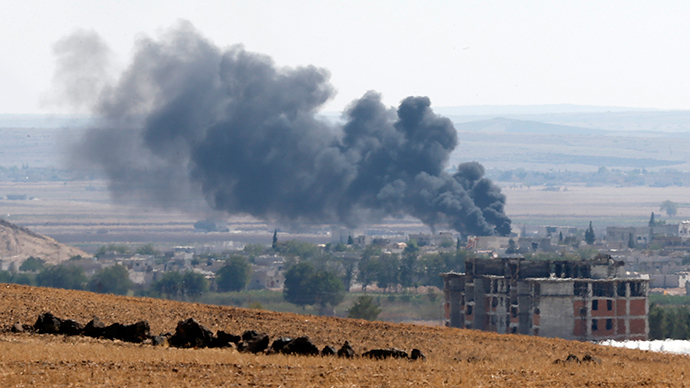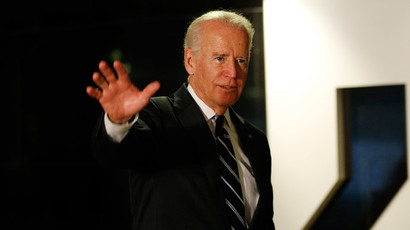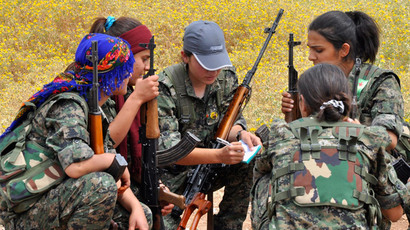2,000 evacuated as ISIS flag raised on outskirts of Kobani, Syria

The black Islamic State flag has been raised over a building on the outskirts of a strategic town of Kobani on the Syrian-Kurdish border, according to various sources. However, Kurds defending the border town say that the city has not yet fallen.
Attacks in the town intensified on Sunday when Islamic State (IS,
formerly ISIS or ISIL) militants besieged the city.
The black flag was seen at the top of a four story building,
according to the images shot from Turkey. A Turkish military
officer who preferred to remain anonymous confirmed to Reuters
that the flag had been that of the Islamists.
Fighting kicked off east of Kobani (Ayn al-Arab in Arabic), the
northern Syrian town facing a fierce onslaught of Islamic State
(IS) on Sunday. However, an initial offensive was launched some
two weeks ago. The jihadist group had earlier pledged to overrun
the town by the beginning of Eid al-Adha, or Feast of Sacrifice.
Shortly after news of the flag's planting emerged, a member of
the Kurdish Democratic Union Party (PYD) announced that more than
2,000 people were being evacuated as IS advanced, reported
Reuters. Over 186,000 Kurds have already fled to Turkey from the
city.
"We can hear the sound of clashes in the street," a translator, Parwer Ali Mohamed, said over the phone as the group made its way to Turkey.
BREAKING: Black flag over #Kobane - #ISIS battles on Turkey-Syria border pic.twitter.com/B1eSDZcXGu
— RT (@RT_com) October 6, 2014
An official in Kobani has told the BBC that the entire city may
fall to Islamic militants “soon.” The official, Idriss
Nassan, said the IS was now in control of Mistenur – a hill of
strategic importance – in the east of the city.
“Yes, it will certainly fall soon,” he said.
However, Reuters’ sources have been dismissive.
“ISIL have only planted a flag on one building on the eastern
side of town,” Ismail Eskin, a journalist in the town told
Reuters. “That is not inside the city, it's on the eastern
side. They are not inside the city. Intense clashes are
continuing.”
Pawer Mohammed Ali, a translator for the PYD inside Kobani also
told the news agency that there was active resistance from the
Kurdish forces.
“During the day sometimes IS makes advances, but YPG pushes
them back. There are clashes within the vicinity, but they are
not inside the city, YPG is resisting,” Ali said.
On Sunday night, a Kurdish female suicide bomber detonated
herself with a grenade in the struggle against the IS in the
town. The woman was identified as Arin Mirkan, a commander in the
Kurdish People’s Protection Unit, and the instance marks the
first of a female suicide attack.
Some 20 IS jihadists have been killed trying to enter Kobani, AFP
cited a monitor as saying on Monday.
Syrian Kurds have been echoing the warnings of a British military
official recently who stated that ground troops are necessary in
the struggle against the IS.
“Airstrikes alone are really not enough to defeat ISIS in
Kobani,” Idris Nassan, a senior spokesman for the Kurdish
fighters, told the Guardian on Monday. “They are besieging
the city on three sides, and fighter jets simply cannot hit each
and every ISIS fighter on the ground.”
Turkish press reported hearing explosions from the other side of
the border early Sunday, with a mortar round from the conflict
landing inside Turkey’s border.
The situation in Kobani has been getting increasingly desperate.
The fighting has already prompted some 186,000 Kurds to flee the
area across the border into Turkey, and groups of Kurdish
volunteers wishing to cross into Syria to defend the town against
IS on Saturday clashed with tear gas-firing Turkish security
forces refusing to let them pass.
Around 100,000 people are still staying in Kobani amid the
violence, according to TASS.














